看病英语-句子
- 格式:doc
- 大小:50.00 KB
- 文档页数:4
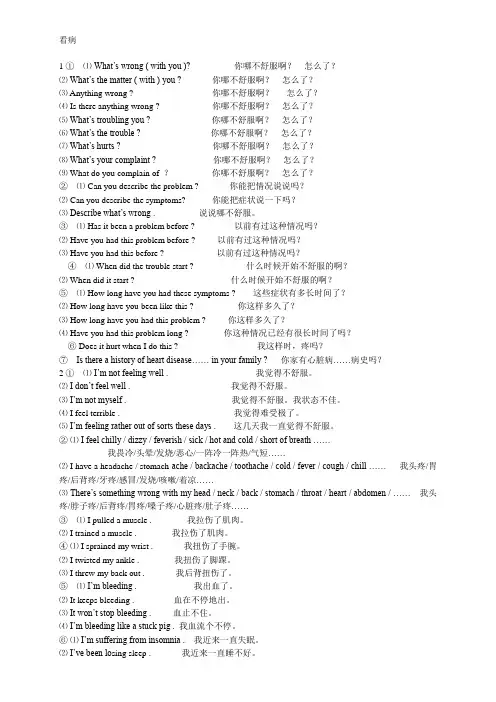
看病1 ①⑪ What’s wrong ( with you )? 你哪不舒服啊?怎么了?⑫ What’s the matter ( with ) you ? 你哪不舒服啊?怎么了?⑬ Anything wrong ? 你哪不舒服啊?怎么了?⑭ Is there anything wrong ? 你哪不舒服啊?怎么了?⑮ What’s troubling you ? 你哪不舒服啊?怎么了?⑯ What’s the trouble ? 你哪不舒服啊?怎么了?⑰ What’s hurts ? 你哪不舒服啊?怎么了?⑱ What’s your complaint ? 你哪不舒服啊?怎么了?⑲ What do you complain of ?你哪不舒服啊?怎么了?②⑪ Can you describe the problem ? 你能把情况说说吗?⑫ Can you describe the symptoms? 你能把症状说一下吗?⑬ Describe what’s wrong . 说说哪不舒服。
③⑪ Has it been a problem before ? 以前有过这种情况吗?⑫ Have you had this problem before ? 以前有过这种情况吗?⑬ Have you had this before ? 以前有过这种情况吗?④⑪ When did the trouble start ? 什么时候开始不舒服的啊?⑫ When did it start ? 什么时候开始不舒服的啊?⑤⑪ How long have you had these symptoms ? 这些症状有多长时间了?⑫ How long have you been like this ? 你这样多久了?⑬ How long have you had this problem ? 你这样多久了?⑭ Have you had this problem long ? 你这种情况已经有很长时间了吗?⑥ Does it hurt when I do this ? 我这样时,疼吗?⑦Is there a history of heart disease…… in your family ? 你家有心脏病……病史吗?2 ①⑪ I’m not feeling well . 我觉得不舒服。
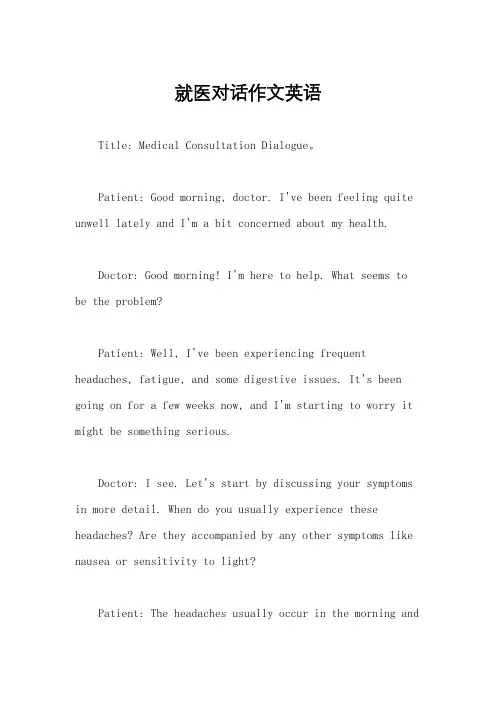
就医对话作文英语Title: Medical Consultation Dialogue。
Patient: Good morning, doctor. I've been feeling quite unwell lately and I'm a bit concerned about my health.Doctor: Good morning! I'm here to help. What seems to be the problem?Patient: Well, I've been experiencing frequent headaches, fatigue, and some digestive issues. It's been going on for a few weeks now, and I'm starting to worry it might be something serious.Doctor: I see. Let's start by discussing your symptoms in more detail. When do you usually experience these headaches? Are they accompanied by any other symptoms like nausea or sensitivity to light?Patient: The headaches usually occur in the morning andthey're often accompanied by nausea. Sometimes, I do feel a bit sensitive to light as well.Doctor: Okay, that's helpful information. And whatabout your fatigue? Have you noticed any patterns ortriggers for feeling particularly tired?Patient: It's been pretty consistent lately. I feeltired throughout the day, no matter how much sleep I get at night. Even after resting, I still feel drained and lacking in energy.Doctor: I see. Fatigue can be quite debilitating. Now, you mentioned digestive issues. Could you elaborate on that?Patient: Sure. I've been having some stomach discomfort, bloating, and occasional heartburn after meals. It's not severe, but it's been bothering me more frequently.Doctor: Thank you for sharing that. Based on your symptoms, there are a few possibilities we should explore. One potential cause could be migraines, especially giventhe nature of your headaches and the accompanying nausea and sensitivity to light. Fatigue and digestive issues could also be related to underlying health issues such as dietary factors or gastrointestinal problems.Patient: That's concerning. What do you recommend we do next?Doctor: I'd like to conduct a physical examination to gather more information. This will involve checking your blood pressure, examining your eyes, and palpating your abdomen. Additionally, I may recommend some blood tests to check for any abnormalities in your blood count or thyroid function. Depending on the results, we may need to pursue further investigations such as imaging studies or referrals to specialists.Patient: Alright, I'm willing to undergo whatever tests are necessary to figure out what's going on.Doctor: Great. In the meantime, I suggest keeping a symptom diary to track the frequency and severity of yoursymptoms. This can provide valuable insights into any patterns or triggers that might be contributing to your condition. Also, try to maintain a healthy lifestyle with regular exercise, a balanced diet, and adequate hydration.Patient: Thank you, doctor. I appreciate your thoroughness and guidance.Doctor: You're welcome. Remember, I'm here to support you every step of the way. Let's work together to get to the bottom of this and improve your health.Patient: Absolutely. I'll follow your advice and stay in touch with any updates.Doctor: Sounds like a plan. Don't hesitate to reach out if you have any concerns or questions in the meantime. Take care, and we'll schedule a follow-up appointment once we have the test results.Patient: Thank you, doctor. Take care. Goodbye.Doctor: Goodbye, and take care.。
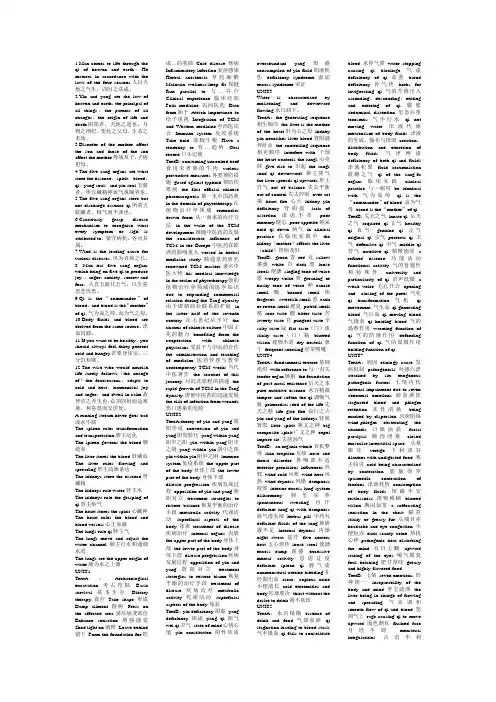
1.Man comes to life through the qi of heaven and earth;He matures in accordance with the laws of the four seasons.人以天地之气生,四时之法成。
2.Yin and yang are the law of heaven and earth,the principal of all things,the parents of all changes,the origin of life and death.阴阳者,天地之道也,万物之纲纪,变化之父母,生杀之本始。
3.Disorder of the mother affect the son and those of the son affect the mother.母病及子,子病犯母。
4.The five zang organs are what store the essence,spirit,blood,qi,yang soul,and yin soul.五脏者,所以藏精神血气魂魄者也。
5.The five zang organs store but not discharge essence qi.所谓五脏藏者,精气而不泄也。
6.Cautiously grasp disease mechanism to recognize what every symptom or sigh is attributed to。
紧守病机,各司其属。
7.Wind is the leading cause for various diseases。
风为百病之长。
8. Man has five zang organs which bring on five qi to produce joy ,anger,anxiety,sorrow and fear。
人有五脏化五气,以生喜怒悲忧恐。
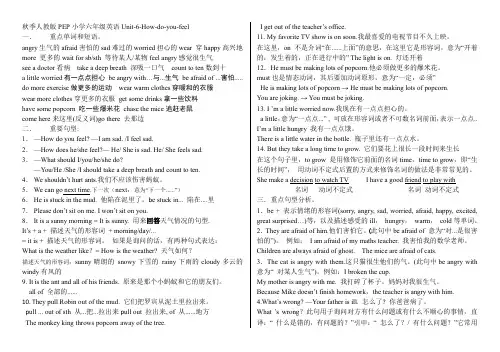
秋季人教版PEP小学六年级英语Unit-6-How-do-you-feel一.重点单词和短语。
angry生气的afraid害怕的sad难过的worried担心的wear 穿happy高兴地more 更多的wait for sb/sth 等待某人/某物feel angry感觉很生气see a doctor看病take a deep breath 深吸一口气count to ten数到十a little worried有一点点担心be angry with…与...生气be afraid of ...害怕..... do more exercise做更多的运动wear warm clothes穿暖和的衣服wear more clothes穿更多的衣服get some drinks拿一些饮料have some popcorn 吃一些爆米花chase the mice追赶老鼠come here来这里(反义词)go there 去那边二.重要句型:1.—How do you feel? —I am sad. /I feel sad.2.—How does he/she feel?— He/ She is sad. He/ She feels sad.3.—What should I/you/he/she do?—You/He /She /I should take a deep breath and count to ten.4.We shouldn’t hurt ants.我们不应该伤害蚂蚁。
5.We can go next time.下一次(next,意为“下一个......”)6.He is stuck in the mud. 他陷在泥里了。
b e stuck in... 陷在....里7.Please don’t sit on me. I won’t sit on you.8.It is a sunny morning = It is sunny. 用来回答天气情况的句型.It’s + a + 描述天气的形容词+ morning/day/...= it is + 描述天气的形容词。
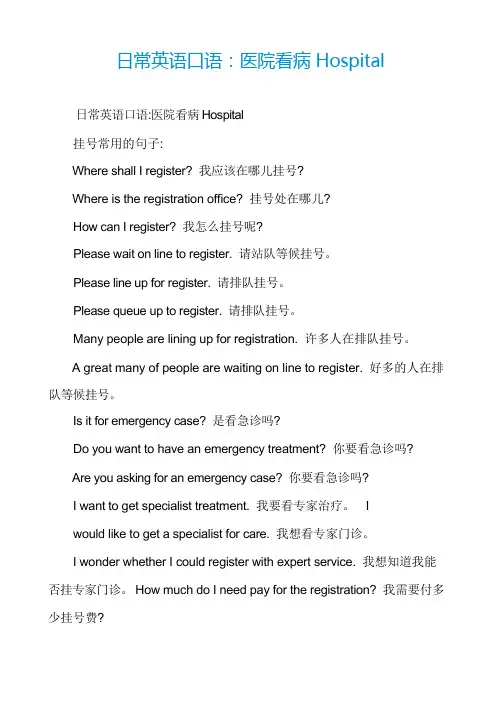
日常英语口语:医院看病 Hospital日常英语口语:医院看病Hospital挂号常用的句子:Where shall I register? 我应该在哪儿挂号?Where is the registration office? 挂号处在哪儿?How can I register? 我怎么挂号呢?Please wait on line to register. 请站队等候挂号。
Please line up for register. 请排队挂号。
Please queue up to register. 请排队挂号。
Many people are lining up for registration. 许多人在排队挂号。
A great many of people are waiting on line to register. 好多的人在排队等候挂号。
Is it for emergency case? 是看急诊吗?Do you want to have an emergency treatment? 你要看急诊吗?Are you asking for an emergency case? 你要看急诊吗?I want to get specialist treatment. 我要看专家治疗。
Iwould like to get a specialist for care. 我想看专家门诊。
I wonder whether I could register with expert service. 我想知道我能否挂专家门诊。
How much do I need pay for the registration? 我需要付多少挂号费?How much are you going to charge me for the registration. 你要向我收取多少挂号费。
The registration fee is 5 yuan. 挂号费五元。
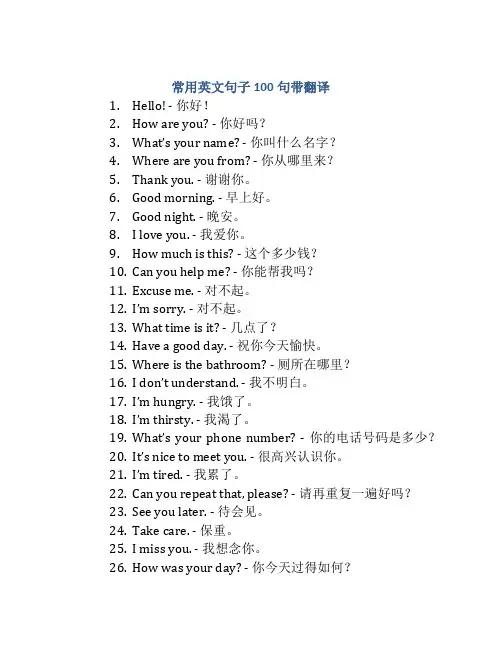
常用英文句子100句带翻译1.Hello! - 你好!2.How are you? - 你好吗?3.What’s your name? - 你叫什么名字?4.Where are you from? - 你从哪里来?5.Thank you. - 谢谢你。
6.Good morning. - 早上好。
7.Good night. - 晚安。
8.I love you. - 我爱你。
9.How much is this? - 这个多少钱?10.Can you help me? - 你能帮我吗?11.Excuse me. - 对不起。
12.I’m sorry. - 对不起。
13.What time is it? - 几点了?14.Have a good day. - 祝你今天愉快。
15.Where is the bathroom? - 厕所在哪里?16.I don’t understand. - 我不明白。
17.I’m hungry. - 我饿了。
18.I’m thirsty. - 我渴了。
19.What’s your phone number? - 你的电话号码是多少?20.It’s nice to meet you. - 很高兴认识你。
21.I’m tired. - 我累了。
22.Can you repeat that, please? - 请再重复一遍好吗?23.See you later. - 待会见。
24.Take care. - 保重。
25.I miss you. - 我想念你。
26.How was your day? - 你今天过得如何?27.What do you do for a living? - 你是做什么工作的?28.Do you speak English? - 你会说英语吗?29.I’m bored. - 我无聊。
30.Let’s go out. - 我们出去吧。
31.I’m so happy. - 我很开心。
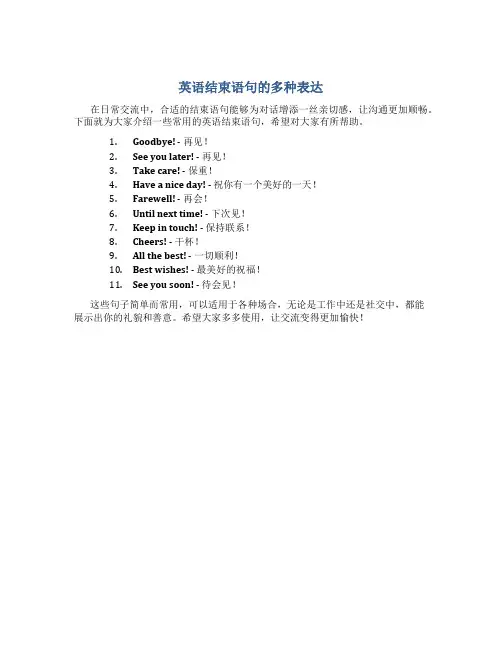
英语结束语句的多种表达
在日常交流中,合适的结束语句能够为对话增添一丝亲切感,让沟通更加顺畅。
下面就为大家介绍一些常用的英语结束语句,希望对大家有所帮助。
1.Goodbye! - 再见!
2.See you later! - 再见!
3.Take care! - 保重!
4.Have a nice day! - 祝你有一个美好的一天!
5.Farewell! - 再会!
6.Until next time! - 下次见!
7.Keep in touch! - 保持联系!
8.Cheers! - 干杯!
9.All the best! - 一切顺利!
10.Best wishes! - 最美好的祝福!
11.See you soon! - 待会见!
这些句子简单而常用,可以适用于各种场合,无论是工作中还是社交中,都能
展示出你的礼貌和善意。
希望大家多多使用,让交流变得更加愉快!。
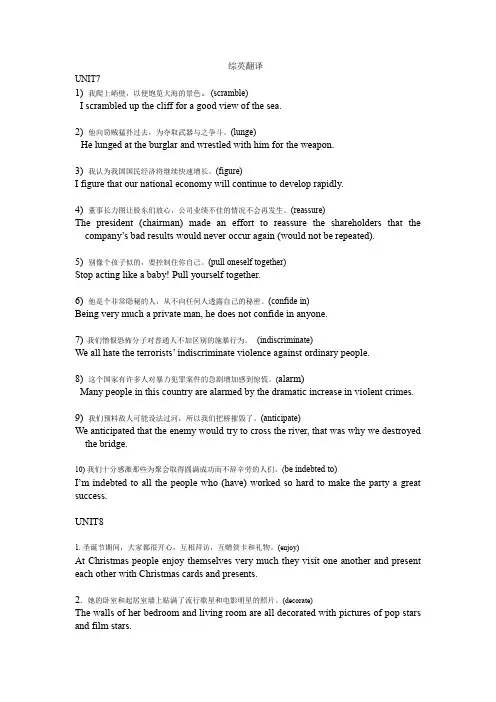
综英翻译UNIT71) 我爬上峭壁,以便饱览大海的景色。
(scramble)I scrambled up the cliff for a good view of the sea.2) 他向窃贼猛扑过去,为夺取武器与之争斗。
(lunge)He lunged at the burglar and wrestled with him for the weapon.3) 我认为我国国民经济将继续快速增长。
(figure)I figure that our national economy will continue to develop rapidly.4) 董事长力图让股东们放心,公司业绩不佳的情况不会再发生。
(reassure)The president (chairman) made an effort to reassure the shareholders that the company’s bad results would never occur again (would not be repeated).5) 别像个孩子似的,要控制住你自己。
(pull oneself together)Stop acting like a baby! Pull yourself together.6) 他是个非常隐秘的人,从不向任何人透露自己的秘密。
(confide in)Being very much a private man, he does not confide in anyone.7)我们憎恨恐怖分子对普通人不加区别的施暴行为。
(indiscriminate)We all hate the terrorists’ indiscriminate violence against ordinary people.8) 这个国家有许多人对暴力犯罪案件的急剧增加感到惊慌。
(alarm)Many people in this country are alarmed by the dramatic increase in violent crimes.9) 我们预料敌人可能设法过河,所以我们把桥摧毁了。

看病英语作文Seeing a Doctor: A Guide to Visiting the Doctor。
Seeing a doctor is an important aspect of maintaining good health. Whether you are dealing with a minor ailment or a more serious condition, it is important to seek medical attention when necessary. In this article, we will discuss the process of visiting a doctor and provide some helpful tips for making the most out of your visit.Step 1: Choosing a Doctor。
The first step in seeing a doctor is to choose one that is right for you. There are several factors to consider when selecting a doctor, including their location, specialty, and availability. You may want to ask for recommendations from friends or family members, or you can search online for doctors in your area.Step 2: Making an Appointment。
Once you have chosen a doctor, the next step is to make an appointment. Most doctors require patients to schedule appointments in advance, although some may accept walk-ins. When making your appointment, be sure to provide the receptionist with your name, phone number, and reason for the visit. You may also need to provide your insurance information.Step 3: Preparing for Your Visit。
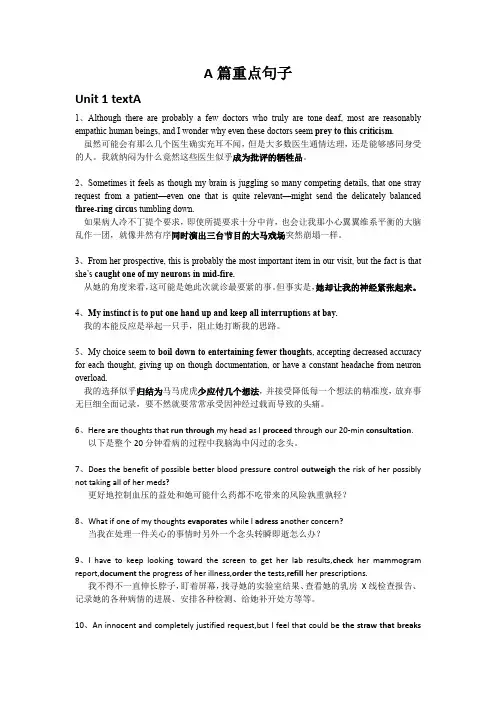
A篇重点句子Unit 1 textA1、Although there are probably a few doctors who truly are tone-deaf, most are reasonably empathic human beings, and I wonder why even these doctors seem prey to this criticism.虽然可能会有那么几个医生确实充耳不闻,但是大多数医生通情达理,还是能够感同身受的人。
我就纳闷为什么竟然这些医生似乎成为批评的牺牲品。
2、Sometimes it feels as though my brain is juggling so many competing details, that one stray request from a patient—even one that is quite relevant—might send the delicately balanced three-ring circus tumbling down.如果病人冷不丁提个要求,即使所提要求十分中肯,也会让我那小心翼翼维系平衡的大脑乱作一团,就像井然有序同时演出三台节目的大马戏场突然崩塌一样。
3、From her prospective, this is probably the most important item in our visit, but the fact is that she’s caught one of my neurons in mid-fire.从她的角度来看,这可能是她此次就诊最要紧的事。
但事实是,她却让我的神经紧张起来。
4、My instinct is to put one hand up and keep all interruptions at bay.我的本能反应是举起一只手,阻止她打断我的思路。
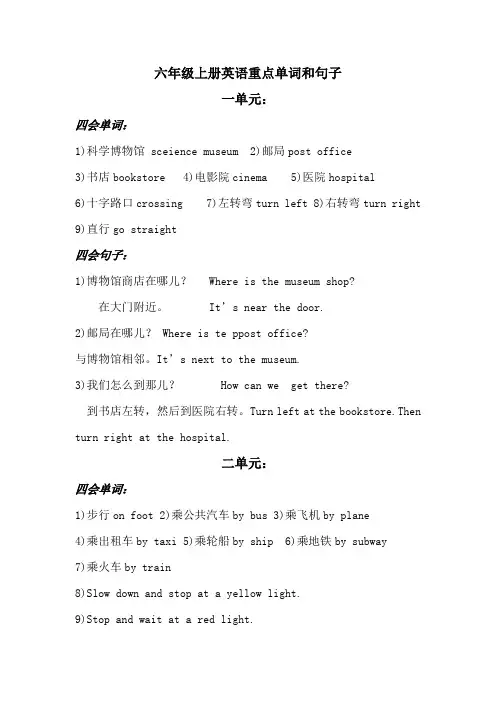
六年级上册英语重点单词和句子一单元:四会单词:1)科学博物馆 sceience museum 2)邮局post office3)书店bookstore 4)电影院cinema 5)医院hospital6)十字路口crossing 7)左转弯turn left 8)右转弯turn right 9)直行go straight四会句子:1)博物馆商店在哪儿? Where is the museum shop?在大门附近。
It’s near the door.2)邮局在哪儿? Where is te ppost office?与博物馆相邻。
It’s next to the museum.3)我们怎么到那儿? How can we get there?到书店左转,然后到医院右转。
Turn left at the bookstore.Thenturn right at the hospital.二单元:四会单词:1)步行on foot 2)乘公共汽车by bus 3)乘飞机by plane4)乘出租车by taxi 5)乘轮船by ship 6)乘地铁by subway7)乘火车by train8)Slow down and stop at a yellow light.9)Stop and wait at a red light.10)Go at a green light.四会句子:1)你怎么来学校的?How do you come to school.通常我步行来,有时我乘公共汽车来。
Usually I come on foot.Sometimes I come by bus.我经常骑自行车来。
I often come by bike.2)我怎样才能到达复兴医院呢?How can I get to the Fuxing Hospital?在那边乘坐57路公交车。
Take the No.57 bus over there.三单元:四会单词:1)拜访祖父母visit my grandparents 2)看电影see a film 3)去旅行take a trip 4)去超市go to the supermarket5)今天早上this morning 6)今天下午this afternoon7)今天晚上this evening 8)在今晚tonight9)明天tomorrow 10)下周next week 11)词典dictionary12)连环画册comic book 13)单词书word book14)明信片postcard四会句子:1)你明天打算做什么?What are you going to do tomorrow?我要上美术课。
PEP 人教版六年级英语上册1人教版2020-2021密 封 线 PEP 人教版六年级英语上册秋季人教版PEP 小学六年级英语Unit-6-How-do-you-feel 一. 重点单词和短语。
angry 生气的afraid 害怕的sad 难过的worried 担心的wear 穿happy 高兴地 more 更多的wait for sb/sth 等待某人/某物feel angry 感觉很生气 see a doctor 看病 take a deep breath 深吸一口气 count to ten 数到十a little worried 有一点点担心 be angry with …与...生气 be afraid of ...害怕..... do more exercise 做更多的运动 wear warm clothes 穿暖和的衣服 wear more clothes 穿更多的衣服 get some drinks 拿一些饮料 have some popcorn 吃一些爆米花 chase the mice 追赶老鼠 come here 来这里(反义词)go there 去那边 二. 重要句型:1. —How do you feel? —I am sad. /I feel sad.2. —How does he/she feel?— He/ She is sad. He/ She feels sad. 3. —What should I/you/he/she do?—You/He /She /I should take a deep breath and count to ten. 4. We shouldn’t hurt ants.我们不应该伤害蚂蚁。
5. We can go next time.下一次(next ,意为“下一个......”)6. He is stuck in the mud. 他陷在泥里了。
六年级上册英语单词和句子Unit 1 How can I get there?一、单词。
1. science [ˈsaɪəns] (n. 科学)2. museum [mjuˈziːəm] (n. 博物馆)3. post office [pəʊst ˈɒfɪs] (n. 邮局)4. bookstore [ˈbʊkstɔː(r)] (n. 书店)5. cinema [ˈsɪnəmə] (n. 电影院)6. hospital [ˈhɒspɪtl] (n. 医院)7. crossing [ˈkrɒsɪŋ] (n. 十字路口)8. turn [tɜːn] (v. 转弯)9. left [left] (adv. 向左;n. 左边)10. straight [streɪt] (adv. 笔直地;adj. 直的)11. right [raɪt] (adv. 向右;n. 右边;adj. 正确的)二、句子。
1. - Where is the museum shop? [weə(r) ɪz ðə mjuˈziːəm ʃɒp] 博物馆的商店在哪儿?- It's near the door. [ɪts nɪə(r) ðə dɔː(r)] 在大门附近。
2. - How can I get to the bookstore? [haʊ kæn aɪɡet tuːðəˈbʊkstɔː(r)] 我怎么到书店呢?- Turn left at the second crossing. [tɜːn left æt ðəˈsekənd ˈkrɒsɪŋ] 在第二个十字路口左转。
Unit 2 Ways to go to school.一、单词。
1. on foot [ɒn fʊt] (步行)2. by [baɪ] (prep. 乘)3. bus [bʌs] (n. 公共汽车)4. plane [pleɪn] (n. 飞机)5. taxi [ˈtæksi] (n. 出租车)6. ship [ʃɪp] (n. 船)7. subway [ˈsʌbweɪ] (n. 地铁)8. train [treɪn] (n. 火车)9. slow [sləʊ] (adj. 慢的)10. down [daʊn] (adv. 减少;降低;prep. 沿着)11. slow down [sləʊ daʊn] (慢下来)12. stop [stɒp] (n. 车站;v. 停止)二、句子。
六年级上册英语六个单元重点单词重点句子和易错题六年级上册英语单词及句子复习Unit1第一单元单词:Science museum科学博物馆post office邮局bookstore书店cinema电影院hospital医院crossing十字路口turn left向左转go straight直走turn right向右转重点句子:1、--Where is the museum shop?博物馆的商店在哪儿?--It`s near the door在大门附近2、--How can we get there?我们怎么到那儿?--Turn left at the bookstore到书店左转Unit2第二单元单词:on foot走路by bus乘公共汽车by taxi乘出租车by plane乘飞机by subway乘地铁by ship乘船by train乘火车slow down减速stop停下wait等go走重点句子:1、--How do you come to school?你怎么来学校的?--Usually,I come on foot通常我走路来2、In the USA people on bikes must wear one.在美国骑自行车的人必须戴头盔。
3、Don’t go at the red light!别闯红灯。
4、I must pay attention to the traffic lights我必须注意交通信号灯Unit3第三单元单词:visit my grandparents拜访我的外祖父母see a film看电影take a trip远行go to the supermarket 去超市dictionary词典comic book连环画书word book单词书postcard明信片重点句子:1、--What are you going to do tomorrow?你明天打算做什么?--I’m going to have an artlesson.我要上美术课2、We’re going to draw some pictures in Renmin Park.我要到人民公园去画画3、--Where are you going?你们打算去哪儿?--We`re going to the cinema我们打算去电影院4、When are you going?你们什么时候去?Unit4第四单元单词:dancing跳舞singing唱歌reading stories看故事书playing football踢足球doing kung fu打功夫cooks Chinese food做中国菜studies Chinese学习汉语does word puzzles猜字谜goes hiking远足重点句子:1、--What are Peter`s hobbies?彼得有什么爱好?--He likes reading stories他喜欢读故事2、--Does he live in Sydney?他住在悉尼吗?--No, he doesn`t不,他没有3、--Does he like doing word puzzles and goinghiking?他喜欢猜字谜和远足吗?--Yes,he does是的,他喜欢Unit5第五单元四会单词:factory worker工厂工人postman邮递员businessman生意人police officer警察fisherman渔民scientist科学家pilot飞行员coach教练重点句子:1、--What does he do?他是做什么的?--He isa businessman.他是商人2、--Where does he work?他在哪儿工作?--He works at sea.他在海上工作。
翻译A1.班长昨天班会课没来。
(absent)The monitor was absent from/ the class meeting /yesterday/yesterday’s class meeting.2.这些建设工程旨在降低人们的生活成本,并改善他们的生活条件。
(aim)These construction projects aim to reduce people’s living costs and (to) improve their living conditions.3.多吃蔬菜和水果,你会保持健康。
(and)Eat more vegetables and fruits and you will be healthy/and you will (can) keep healthy.4.Jenny非常希望她的父母能允许她独自一人去日本旅游,但令她失望的是,他们不同意,还给出了N条理由。
(anxious)Jenny was anxious for her parents to allow her to travel in Japan alone , but to her disappointment, they disagreed,and gave several reasons.5.只要不断努力,你们所有的梦想都会实现的。
(as long as)As long as you keep (on) working hard, all your dreams will come true/ be realized.6.我不赞成儿童参加中国达人秀(China’s Got Talent),因为这会使他们梦想一夜成名。
(approve of)I don’t a pprove of children competing in China’s Got Talent,because this will make them dream of becoming famous overnight.7.我在全神贯注地看书,没有听到手机在响。
医院常用英语:词汇及简单句子1 病历case histroy 一般事项date of admission /marital status /present address /correspondence / occupation 主诉chief complaints 现病史present illness / history of present illness 既往史past medical history 家族史family history 个人病史personal history / social history 曾用药物medications 过敏史allergies 系统回顾system review / review of system 体检physical examination 一般资料physical data 生理指标physical signs 一般状况或全身状况general appearance 头眼与耳鼻喉head ,eyes,ear,nose,throat 略, 作heent.胸部与心肺CHEST,heart,and lungs 腹部abodoms四肢extremities 神经系统nervous system,Neurological, 略作CNC 或Neuro, 骨骼肌系统Musculoskeletal 泌尿生殖系统Genitourinary 化验室资料laboratory data/ studies /diagnosis 血液检查blood test 化学7 项指标chem.-7 心脑电图electrocardiogram / electroencephalogram , 略作EKG/EEGX 线检查与x 光片X-ray examination, x-ray slides,计算机X 线断层扫描与核磁共振扫描资料computerized x-ray tomography and nuclear magnetic resonance spectroscopy dta. CT AND NMR 其他检查资料other lab data 印象与诊断impression and diagnosis 住院治疗情况hospital course出院医嘱discharge instructions / recommendations 出院后用药discharge medications2 看病时用英文1)一般病情:He feels headache, nausea and vomiting. (他覺得頭痛、噁心和想吐。
仁爱版九年级英语上册单词词组句子复习九年级上册Unit1 Topic11. 回来 come back2. 发生 take place3. 太……以至于 so…that…4. 拍照 take photos5. 顺便说一下 by the way6. 去过某地 have been to +地名7. 去了某地 have gone to +地名8. 参加 take part in9. 向……学习 learn from10. 在过去 in the past11. 过着艰苦的生活 live a hard life12. 为...支付... pay for13. 为了 in order to14. 给某人提供帮助 give support to sb.15. 获得良好的教育 get a good education16. 某人亲眼看见某物 see sth. oneself17. 与……保持联系 keep in touch with…18. 遥远的far away19. 目前,现在 at present20. 不但而且…not only… but also…21. 而且,更多的是what’s more22. 取得进步 make progress23. 在做某事方面获得成功 succeed in (doing) sth.24. 受……欢迎 be popular with…25. 比起(做)……更喜欢(做) prefer (doing ) sth. to (doing) sth.26. 在野外 in the open air27. 在某人的帮助下 with the help of sb/ with one's help28. 起草,拟定 draw up29. 仔细检查 check over30. 多亏于,由于 thanks to九年级上册Unit1 Topic1重点单词九年级上册Unit1 Topic1重要句子:1.长假过后,琳琳很高兴见到她的朋友们。
看病1 ①⑪ What’s wrong ( with you )? 你哪不舒服啊?怎么了?⑫ What’s the matter ( with ) you ? 你哪不舒服啊?怎么了?⑬ Anything wrong ? 你哪不舒服啊?怎么了?⑭ Is there anything wrong ? 你哪不舒服啊?怎么了?⑮ What’s troubling you ? 你哪不舒服啊?怎么了?⑯ What’s the trouble ? 你哪不舒服啊?怎么了?⑰ What’s hurts ? 你哪不舒服啊?怎么了?⑱ What’s your complaint ? 你哪不舒服啊?怎么了?⑲ What do you complain of ?你哪不舒服啊?怎么了?②⑪ Can you describe the problem ? 你能把情况说说吗?⑫ Can you describe the symptoms? 你能把症状说一下吗?⑬ Describe what’s wrong . 说说哪不舒服。
③⑪ Has it been a problem before ? 以前有过这种情况吗?⑫ Have you had this problem before ? 以前有过这种情况吗?⑬ Have you had this before ? 以前有过这种情况吗?④⑪ When did the trouble start ? 什么时候开始不舒服的啊?⑫ When did it start ? 什么时候开始不舒服的啊?⑤⑪ How long have you had these symptoms ? 这些症状有多长时间了?⑫ How long have you been like this ? 你这样多久了?⑬ How long have you had this problem ? 你这样多久了?⑭ Have you had this problem long ? 你这种情况已经有很长时间了吗?⑥ Does it hurt when I do this ? 我这样时,疼吗?⑦Is there a history of heart disease…… in your family ? 你家有心脏病……病史吗?2 ①⑪ I’m not feeling well . 我觉得不舒服。
⑫ I don’t feel well . 我觉得不舒服。
⑬ I’m not myself . 我觉得不舒服。
我状态不佳。
⑭ I feel terrible . 我觉得难受极了。
⑮ I’m feeling rather out of sorts these days . 这几天我一直觉得不舒服。
②⑪ I feel chilly / dizzy / feverish / sick / hot and cold / short of breath ……我畏冷/头晕/发烧/恶心/一阵冷一阵热/气短……⑫ I have a headache / stomach-ache / backache / toothache / cold / fever / cough / chill …… 我头疼/胃疼/后背疼/牙疼/感冒/发烧/咳嗽/着凉……⑬ There’s something wrong with my head / neck / back / stomach / throat / heart / abdomen / …… 我头疼/脖子疼/后背疼/胃疼/嗓子疼/心脏疼/肚子疼……③⑪ I pulled a muscle . 我拉伤了肌肉。
⑫ I trained a muscle . 我拉伤了肌肉。
④⑪ I sprained my wrist . 我扭伤了手腕。
⑫ I twisted my ankle . 我扭伤了脚踝。
⑬ I threw my back out . 我后背扭伤了。
⑤⑪ I’m bleeding . 我出血了。
⑫ It keeps bleeding . 血在不停地出。
⑬ It won’t stop bleeding . 血止不住。
⑭ I’m bleeding like a stuck pig . 我血流个不停。
⑥⑪ I’m suffering from insomnia . 我近来一直失眠。
⑫ I’ve been lo sing sleep . 我近来一直睡不好。
⑬ I can’t sleep . 我睡不着觉。
⑭ I lie awake all night long . 我一整夜都不能入睡。
⑮ I’ve been really sleepy . 我的确睁不开眼睛。
⑯ I’m always drowsy . 我总想打瞌睡。
我总是昏昏欲睡。
⑰ I can’t seem to stay awake . 我好象眼皮很沉。
⑦⑪ I’ve go t diarrhea. 我拉肚子了。
⑫ I’ve got the runs . 我拉肚子了。
⑧I’m constipates. 我有便秘。
⑨⑪ My skin itches . 我的皮肤发痒。
⑫ I have a rash . 我发皮疹了。
⑬ I’ve got blotches all over my skin . 我浑身上下都发了疹块。
⑭ I’ve got the se bumps on my skin . 我的皮肤上长出了这些肿块。
⑩ I’m aching all over . 我浑身上下都疼。
3 ①⑪ Do you have any allergies ? 你患有过敏症吗?⑫ Are you allergic to any medications ? 你对药物过敏吗?⑬ Are you allergic to penicillin ? 你对青霉素过敏吗?4 ①Let me examine your heart / lungs / throat …… 让我检查一下你的心脏/肺脏/嗓子……②⑪ Don’t worry . 别担心。
⑫ There’s nothing to worry about . 别担心。
③ Let me feel your pulse . 让我先给你把把脉。
④ Y our temperature is a little high . 你的体温有点高。
⑤ Put the thermometer under your arm . 把体温计夹在胳膊下面。
⑥ Open your mouth and show me your tongue . 张开嘴,让我看看你的舌头。
⑦ I’d like to run a few tests first . 我最好还是先给你做几个检查。
⑧ Y ou’d better go and have an x-ray . 你最好还是先去透视吧。
⑨ In that case ,you’d better have a general check-up . 那样的话,你最好做一次全身检查。
⑩ I think you’d better take it easy for several days . 我看你最好静休几天。
5 ①⑪ I’ going to write you a prescription . 我这就给你开处方。
⑫ I’m going to give your prescription . 我这就给你开处方。
⑬ I’m going to give you something for the pain . 我这就给你开药。
② I’d like to take a blood sample . 我要采些血样。
③ The results should be back in a week . 检查结果要一周后能知道。
6 I’m going to refer you to so meone else . 我将把你转诊到另一个医生那儿。
7 ①⑪ Take a dose three times a day . 每日服三次,每次服一剂。
⑫ One teaspoon daily . 一天服1茶匙。
⑬ One teaspoon three times daily . 每天服3次,每次1茶匙。
⑭ One tablet three times daily . 每天服3次,每次服1片。
⑮ Two capsules three times daily . 每天服3次,每次服2粒胶囊。
⑯ Take three times daily . 每天服3次。
⑰ Take in the morning . 上午服用。
⑱ Take after eating . 临睡前服用。
⑲ Take before eating . 饭后服用。
⑳ Take before going to bed . 饭前服用。
⑴ Take two of the pills each morning for two weeks . 每天上午服2丸,连服2周。
⑵ Not to be taken more than four times within 24-hour period .24小时内,服药不能超过4次。
⑶ This medication should be taken with meals . 这种药需在进餐时服用。
⑷ This medication should be take with food . 这种药需在进餐时服用。
⑸ Don’t eat for half an hour before or after taking this medicine .服用次药前(后)半小时内不能吃东西。
⑹ Don’t operate heavy machinery while taking this medication .服用此药期间切勿操作重型机械。
⑺Don’t drive after taking this medication . 服用此药后切勿开车。
② Drink more hot water . 多喝热水。
③ Drink plenty of water . 大量地喝水。
④ Have a good rest . 好好休息一下。
⑤Be careful of your diet . 注意饮食。
⑥⑪ Stay in bed as much as possible . 尽量在床上多躺几天。
⑫ Have a good long lie . 好好地多躺一躺。
⑦ Be sure to keep warm and rest . 注意保暖和休息。
⑧ Don’t overdo things . 不要过度劳累。